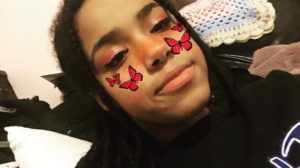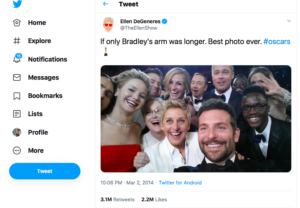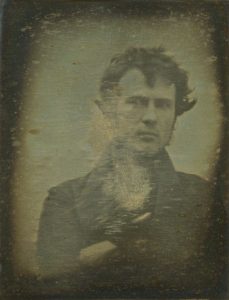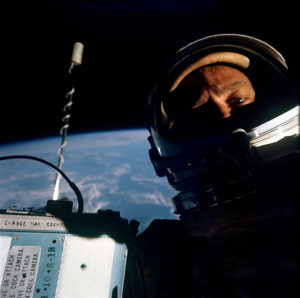The rise of the ‘selfie’ and switch to ‘selfie surgery’ goals
Let’s talk selfies.
When the iPhone was released in 2007, Steve Jobs couldn’t have predicted “selfies” becoming the future of smartphone photography. But in 2020, not only has the selfie become the normal platform for self-expression, it has become the newest inspiration for cosmetic surgery.
“I probably take about eight or ten [selfies] before I post something,” said 16-year-old Caressa Brown. “I take them and then I delete them and then I take them and then I delete them.”
Listen to Caressa Brown below:
In 2013, the Oxford Dictionary announced their word of the year to be “selfie,” defined as “a self-portrait photography that one has taken of oneself, typically with a smartphone or webcam, and uploaded to a social media website.”

16-year-old Caressa Brown poses for a ‘Snapchat-selfie’
A selfie can be taken on your own or with friends. The camera is held at arm’s length or pointed at a mirror … but a selfie holds more weight than the simple act of taking a photo. Before publicly posting, the selfie-taker can control how their audience will view them. They can download (free or paid) applications that give a multitude of options for framing, backgrounds, filters, cartoons, add-ons and photo editing. These apps allow people to alter and present themselves to the public in whatever fashion they deem desirable.
“I always use a filter,” says Brown. “They just make your face less acne, and they just make you look all perfect.”
Listen to Caressa Brown below:
Selfies have become an incredibly popular and socially acceptable activity. Where they used to be primarily taken at special events or on vacation, people now take them when out for dinner, waiting for the bus and sometimes for social commentary. Positive or negative attention online can lead to photos being shared or commented on so much they go viral. This is especially true in the celebrity world.

The selfie that broke the internet. In 2014, Oscar host Ellen DeGeneres shared a record-breaking selfie with (left-to-right) Jared Leto, Jennifer Lawrence, Channing Tatum, Meryl Streep, Julia Roberts, Kevin Spacey, Bradley Cooper, Brad Pitt, Lupita Nyong’O, Peter Nyong’O and Angelina Jolie. (Image: Ellen Degeneres Twitter account)
For teens, social media is a way to remain connected with their friends and express themselves. However, some depend heavily on positive feedback and how many ‘likes’ and comments they get on their posts validate their self-worth. Those with a negative body image could be more likely to over-post than their more confident classmates.
“I post mostly on Instagram and Snapchat,” said Brown. “I always look to see how many ‘likes’ I get – usually it’s my friends.”
Brown’s mom won’t let her talk to anyone she doesn’t know on social media, especially anyone older than she is or appear “weird.”
But a parent stepping in doesn’t always stop outsiders from creeping on their kids’ posts.
“Sometimes I’ll get 20-year-olds texting me, that I’m beautiful,” said Brown. “Then I’m like, you don’t even know me, I can’t be friends with you.”
Listen to Caressa Brown below:
In 2014, DJ Rick McNeely started celebrating June 21 as ‘National Selfie Day’. On National Selfie Day, people are encouraged to take creative, appropriate selfies and share them on social media, tagging #NationalSelfieDay.
While the act of taking a selfie may predate social media, smartphones and the word which is now in the Oxford dictionary, the popularity of taking these self-portraits and the ability to do so has never been easier. Selfie sticks and multi-functional camera phones make it all too easy to take these kinds of photographs as well as group selfies.

The first-ever ‘selfie’ was taken in 1839. While not termed as such then, the self-portrait was taken by Robert Cornelius, an amateur chemist and photographer in Philadelphia. Cornelius took the picture of himself in the back of his family’s chandelier store. He set up the camera and then ran into the frame for the picture.
(Image: Robert Cornelius’s self-potrait -publicdomainreview.org)
There has been comprehensive research done over the years relating selfies to narcissism and the desire for social attractiveness. Data shows the taking of selfies may be a “self-oriented action which allows users to establish their individuality,” however, loneliness, self-importance, attention-seeking and self-centered behaviour had a significant relationship with selfie-liking. Although initial media reports thought that selfie-taking would be a fad, it appears that the “behaviour has become more endemic and is a very popular activity among adolescents and emerging adults.”
But the growing influence of social media has led to to a new condition sweeping the globe known as “Snapchat dysmorphia.” Local plastic surgeon Dr. Gregory Chow says people are requesting cosmetic surgery to resemble how they see themselves on Snapchat.
“It used to be that people would come in asking to have a nose looking more like their favourite actor or actress and now because of being able to do this with just a simple swipe, they think that it’s something that can just be easily done.”
Listen to Dr. Chow below:

In 1966, astronaut Buzz Aldrin took a picture of himself during the Gemini 12 mission, making it the first selfie taken in space. (Image: Wikimedia Commons)
Apps like FaceTune are a big contributor to celebrities and young people easily retouching their smartphone photos and sharing on social media. FaceTune’s original version is free on the iPhone and allows you to airbrush out your pores, lines, imperfections, increase the size of your eyes, whiten your teeth, slim your face and shrink your waist. The newly updated FaceTune2 is available for purchase and even has an option for monthly subscriptions.
Easier to use than Photoshop and better than filters found on Instagram or Snapchat, FaceTune is popular amongst young people, amateur photographers and makeup artists.
Learn about FaceTune on Youtube here.
But despite the knowledge that these apps are being used to create fake representations of people, it doesn’t seem the younger generation wants the selfie to go away.
“I feel like it gives people confidence,” said Brown.“They’ll feel pretty and then they’ll want to take more, but even if they feel ugly they’ll want to take more until they feel pretty. So I don’t think it will ever stop in that way, because if they do get compliments, it’s like this rush and it feels nice to be acknowledged.”
To listen to the full MediaPlex ‘Selfie’ radio interview, click below:


